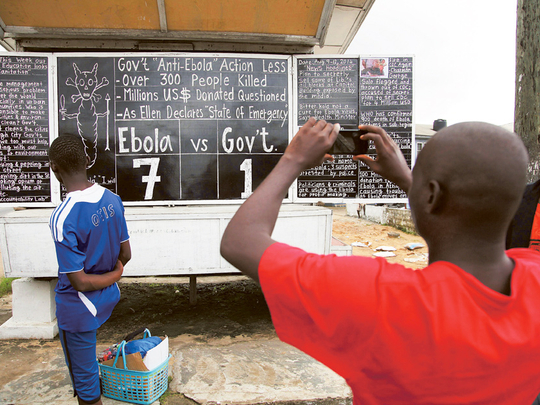
London: The international response to the Ebola outbreak that has killed almost 1,000 Africans has been slow and inadequate, and the World Health Organisation is at least partly to blame, said spokesmen for two key aid groups.
The WHO on Friday designated the outbreak as an international public health emergency, eight months after it began. On May 18, when the situation seemed to be stabilising, the Geneva-based organisation said the outbreak “could be declared over on May 22.”
The WHO’s leaders “need to do a reality check and step up,” Koen Henckaerts, a health expert at the European Commission’s humanitarian aid division, said in a telephone interview from the Liberian capitol of Monrovia. “There is a lack of coordination among all the different partners.”
It’s the first time Ebola has appeared in West Africa. A lack of border controls has allowed infected people who didn’t seek medical care because of fear, suspicion or stigma to travel freely between countries. Unsanitary funeral practices involving contact with corpses have also fanned the spread.
Ghanaian authorities are carrying out tests on the body of a man from Burkina Faso who died near the border between the two West African countries after showing symptoms of Ebola, Accra-based Citi FM reported on Saturday, without saying when the man died. Canadian medics are also testing a patient in Ontario who has flu-like symptoms after recently travelling to Africa, health officials said.
Part of the problem is weak leadership by health ministries in the affected countries, which have never faced the disease and need help with hands-on management, Henckaerts said, calling for more WHO involvement.
“The WHO has a big responsibility to do more than just give technical advice,” he said.
Doctors Without Borders, with almost 700 workers in the affected region, also was critical, saying in a statement that it has been repeating for weeks that “a massive medical, epidemiological and public health response is desperately needed to save lives and reverse the course of the epidemic.”
Lives are being lost, the doctors’ group said, because the response is too slow.
“We try to exert the degree of leadership which is necessary for the situation,” Keiji Fukuda, the organisation’s assistant director general, said in an interview. “At the same time, we always respect the sovereignty of countries. We don’t see ourselves as a policeman just saying, ‘do this, do that.’”
Guinea said on Saturday it closed its border with Sierra Leone until the virus is under control. It also shut its border with Liberia, Reuters reported, citing Health Minister Remy Lamah. Health authorities in Nouadhibou, Mauritania’s second-largest city, set checkpoints at port, airport and land routes, online news site Mauriweb reported.
In May, after the WHO predicted the outbreak’s close, staff members from several international health groups left the region. Rather than ending, however, there may just have been a lull in cases as infections went unreported, causing the epidemic to reignite and worsen in Sierra Leone and Liberia, said Stephan Monroe, the deputy director of the CDC’s National Centre for Emerging and Zoonotic Infectious Diseases.
“In hindsight, the collective we — that is, the international response — should have made sure the fire was entirely out,” Monroe said in an interview.
In May, “we thought it would come under control based on our earlier experience,” Fukuda said. “Now, on a day-to-day basis, we reassess the situation and figure out how we go forward.”
The criticism echoes comments directed against US health officials during a congressional hearing this week by a top official at Samaritan’s Purse, the nonprofit missionary group Brantly was working with when he was infected.
Ken Isaacs, vice president of international programmes and government relations for the aid group, testified that the US and Europe essentially ignored the rising case numbers until Brantly and Writebol, both Americans, were infected in July.
“That the world would allow two relief agencies to shoulder this burden along with the overwhelmed ministries of health in these countries testifies to the lack of serious attention the epidemic was given,” Isaacs said in his written testimony.
— Washington Post












